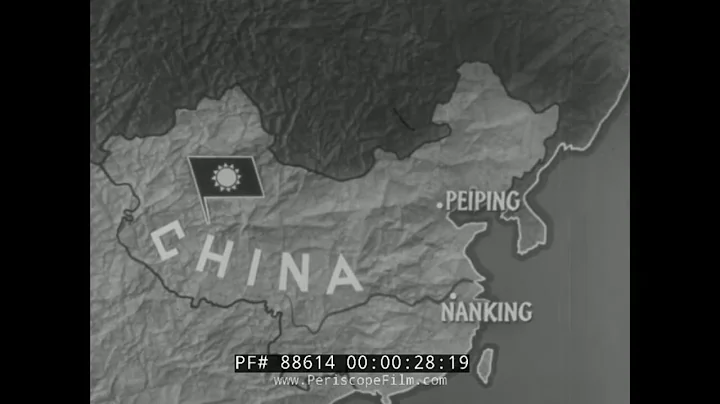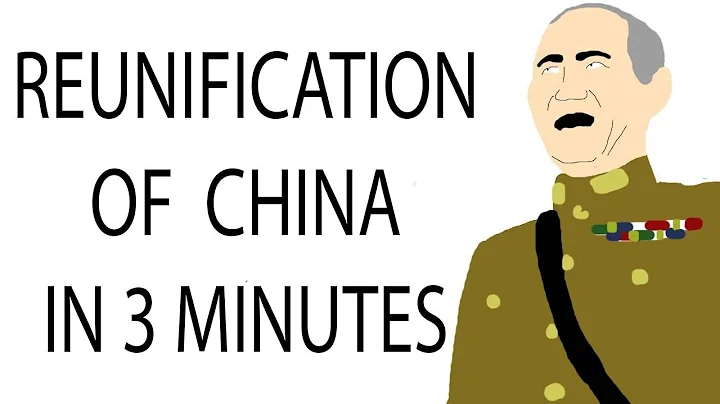On the afternoon of May 12, 1947, Guo Rugui, then Lieutenant General Director of the Third Department (Operations Department) of the Ministry of National Defense of the Kuomintang government, received a call from Yu Jishi, the director of Chiang Kai-shek's Attendant Office, saying that Chiang Kai-shek had invited combatants to come that night. He attended the dinner at his official residence and studied the Shandong operations. At 20:30, Chief of Staff Chen Cheng, Deputy Chiefs of Staff Liu Fei and Guo Rugui attended the dinner together with Director of the Second Department of the Ministry of National Defense in charge of intelligence Hou Teng.
At this time, the military situation in Shandong was urgent. Chen Yi led the East China Field Army to appear and disappear, attacking in the east and west, leaving Xuzhou in a hurry. Guo Rugui and Hou Teng reported on the battlefield situation and combat plan respectively. After Guo and Hou finished their reports, Chen Cheng spoke about troop deployment and combat plans. Chiang Kai-shek decided the direction and target of the attack on the spot. He used Tang Enbo's corps to attack Yingcheng and Yishui , Ouzhen corps to attack Nanma, and Wang Jingjiu's corps to attack Boshan, "encircling the Communist army." Guo Rugui wrote them down one by one.
After returning to his residence, Guo Rugui copied Chiang Kai-shek's combat deployment on a piece of paper in very small characters. Just after I finished writing, Ren Lianru, an underground party member, happened to be visiting. Guo Rugui handed over the combat deployment to Ren, and also emphasized: In this battle sequence, the Seventy-fourth Division was reorganized. This division is all equipped with American equipment. It has 3 brigades and a total of more than 37,000 people. It has strong combat effectiveness. The division commander Zhang Lingfu is a famous anti-Japanese general who is brave and good at fighting. The People's Liberation Army must be especially careful.

Guo Rugui
Guo Rugui came into contact with communism during the fifth period of Huangpu . Later, under the command of Wu Yuzhang, he entered his cousin, Sichuan Army Guo Rudong to perform tasks, and joined the Communist Party during this period. After Guo Rudong defected to Chiang Kai-shek, the Communists in the army were purged. Although Guo Rugui did not reveal his identity, because he was too close to the Communists, he was sent to Japan to study military by Guo Rudong, and he lost contact with the organization since then. After returning to China, he entered the Army University, where he was highly appreciated by the principal, Yang Jie. During the Anti-Japanese War, he became a member of Chen Cheng's system due to his relationship with his classmates at the University of China. During the Anti-Japanese War, Guo Rugui became the "military elite" in Chiang Kai-shek's mind by virtue of his excellent military qualities and unafraid of death.
In May 1945, Guo Rugui ran into Ren Tiyou, a classmate of the fifth phase of Huangpu at the Military Affairs Office. They were once familiar comrades in the party. Guo Rugui expressed his eagerness to find the party organization, but Ren Tiyou also lost contact with the party organization for many years, but his cousin Ren Lianru was an underground worker. In this way, with the help of Ren Lianru, Guo Rugui met Dong Biwu and became a senior intelligence officer, with Ren Lianru as his single line of contact. However, because he had lost contact with the organization over the years and had been serving in the Kuomintang army, his request to reinstate his party membership was not immediately approved.
Although Guo Rugui's request for reinstatement of party membership failed for a while, he has since then strictly followed the standards of a Communist Party member and insisted on being honest and self-reliant in the officialdom of the Kuomintang. In 1946, Guo went to Nanjing to work and rented an ordinary private house in Sitiao Lane. At that time, Chiang Ching-kuo lived in Santiao Lane and was a close neighbor to him. One day, Jiang Jingguo and his confidant Jia Yibin went to visit Guo Rugui.
According to the memories of Guo Rugui's son Guo Xiangcao: Chiang Ching-kuo walked back and forth in the four alleys twice but could not find Guo's mansion. Because he always wanted to have a better house, no one named Guo was found when he asked. At this time, a passerby pointed out to him that there was a butcher's shop selling meat over there, and there was a shop above that seemed to be from the Ministry of National Defense. Jiang Jingguo found the butcher shop. The first floor was where the meat was sold, and our family lived on the second floor. After Jiang Jingguo went upstairs, my father was not at home, but my mother, me, my sister and an old lady were eating. My mother did not know Chiang Ching-kuo. When people from the Ministry of National Defense came, she served tea, asked him to sit down, and exchanged greetings, but she was not particularly enthusiastic. Chiang Ching-kuo was also shocked at the time because there was a butcher’s shop underneath, but there was no meat for lunch at our house, only two vegetarian dishes. Chiang Ching-kuo said that if the cadres of the party-state were like Guo Rugui, the party-state would be saved.
It is worth mentioning that Jia Yibin, who accompanied Chiang Ching-kuo to visit Guo Rugui, led an uprising of Chiang Ching-kuo's cronies known as the "Prince's Army" in 1949, dealing a final heavy blow to the desperate Jiang family and his son.

Guo Rugui's frugality was also questioned by Du Yuming, but the ending was ridiculous. Du Yuming ran to Chiang Kai-shek and complained, calling Guo Rugui a "communist spy". When Chiang Kai-shek asked him the reason. Du Yuming said, "I am incorruptible enough myself, but this 'Guo Xiaogui' is even more incorruptible. He is not a womanizer, and he is not greedy for money. He even patches the sofa at home!" Chiang Kai-shek listened. Not only did he not believe it, he became furious: Are the officials of our dignified National Government not communists if they have to make money everywhere? joke!
At that time, Guo Rugui could be said to have a prosperous official career in the Kuomintang army and was extremely popular. In June 1946, after completing preparations for war, Chiang Kai-shek tore up the armistice agreement and brazenly launched a full-scale civil war. Based on the suggestion of the US special envoy Wedemeyer , Chiang reorganized the Military Commission into the Department of Defense to unify the army, navy and air force. Chen Cheng, the Chief of Staff of the Ministry of National Defense who has the real power, first appointed Guo Rugui as the Deputy Director of the Major General's Office; within a few days, he suddenly appointed Guo as the Lieutenant General Director of the Fifth Department of the Ministry of National Defense, which controlled military affairs; soon Chen Cheng was criticized for his poor performance. He also recommended Guo to Chiang Kai-shek as the Lieutenant General Director of the Third Department of the Ministry of National Defense (i.e., the Operations Department) in charge of operations, and was once sent to Xuzhou to serve as Gu Zhutong as the Chief of Staff of the Army Headquarters as the Commander-in-Chief. These positions basically have direct access to the top secrets of the Kuomintang army.
After Chiang Kai-shek brazenly launched a civil war in disregard of national public opinion, the East China Liberated Area was regarded as a serious problem by Chiang Kai-shek because it faced Nanjing and Shanghai, the centers of Kuomintang rule. "How can we allow others to sleep soundly on the side of the couch?" He ordered the mobilization of hundreds of thousands of troops from Xuzhou to the south, from the Jinpu Railway to the east, and from the Yangtze River to the north, intending to capture the central Jiangsu and the northern Jiangsu liberated areas first. Then he transferred his troops north to Shandong to "capture Chen Yi alive."
Suddenly, dark clouds came over the city and threatened to destroy it. Chen Yi jumped up and said: We shed our blood and sacrificed our lives to liberate a large area of land from Japan. Now, Chiang Kai-shek wants to snatch the fruits of the victory of the Anti-Japanese War from us, but I won't agree! Chiang Kai-shek relies on the millions of troops equipped by the United States to try to slap the people down. It is really deceiving! Each of us must make up our mind to fight back in self-defense, hold a celebration meeting if we win, hold a criticism meeting if we win, and hold a memorial service if we are killed. We are mourning soldiers, and mourning soldiers will win!

Chen Yisuyu
While working in the Peking Military Mediation Executive Department in 1946, he was led by the "Three-person Group" and came to Jinan with Zhou En. Chen Yi was then the deputy secretary of the East China Bureau of the Communist Party of China, the commander of the Shandong Military Region, and the commander of the New Fourth Army. He met Guo Rugui, and Guo gave him a letter written by Chen Yi's brother.
The civil war launched by Chiang Kai-shek was unpopular and failed one after another on various battlefields. Take the East China battlefield as an example:
From July 13 to August 31, 1946, 120,000 Kuomintang troops attacked the liberated areas in Central Soviet Union. Our Central China Field Army faced the battle with a main force of 30,000 people. We cleverly fought seven battles, winning every battle and annihilating 53,000 enemies.
The Kuomintang army attacked the "Two Huaihe Rivers" (Huai'an, Huaiyin) and lost troops and generals. In the two attacks on Lianshui , the reorganized 74th Division, known as the "Ace Army", lost more than 8,000 people, seriously damaging the vitality of the division. Another main division reorganized the 28th Division, which also lost more than 3,000 men.
htmlIn mid-December, the Kuomintang's reorganized 69th Division with more than 20,000 people was wiped out in Suqian, northern Jiangsu. Lieutenant General Dai Zhiqi, the commander of the division, committed suicide.
In the Battle of Lunan in January 1947, the reorganized 26th Division was completely wiped out, and Lieutenant General Ma Liwu, the division commander, was captured. The reorganized 51st Division was completely wiped out by the People's Liberation Army, and Lieutenant General and Division Commander Zhou Yuying was also taken prisoner. Rapid columns fully equipped with beautiful equipment, hundreds of tanks and armored vehicles, and brand-new American large and medium-sized Dodge cars, all became the trophies of the People's Liberation Army in the mud of Lunan.
What was even more unexpected by Chiang Kai-shek was that he carefully organized three armies with nearly 100,000 troops. His favorite general, Li Xianzhou, who graduated from the first class of Huangpu, served as the frontline commander. He marched south from the Jiaoji line, preparing to outflank the East China Field Army. However, , the "surprise soldier" in Chiang Kai-shek's mind, was introduced into the encirclement by the People's Liberation Army. In just 43 hours, the entire army was wiped out, and Li Xianzhou was also captured by the Communist Party. A series of failures forced Chiang Kai-shek to conduct "examination" and "reflection".
On February 19, 1947, Chiang Kai-shek gave a report to the officer training group in Nanjing, titled "Review of the Campaign to Suppress Bandits and Future Improvements of Our Army." He said in the report, "The bandits in the pass can be roughly divided into five groups. Among these five groups, according to my observation, Chen Yi's group is the most tenacious, has the most tricks, and is the most difficult to eliminate..."
After "review" At that time, Chiang Kai-shek decided to change the situation of being beaten in which "the more land occupied, the more divided the troops would be, but they would be restrained by the bandits everywhere and become passive". He concentrated his troops and launched key attacks in the liberated areas of northern Shaanxi and Shandong.
The military conference mentioned at the beginning of this article was Chiang Kai-shek's operational deployment for launching a key offensive in Shandong. In addition to Guo Rugui, there was also a crucial figure attending the meeting - Liu Fei, Deputy Minister of Defense of the Kuomintang government. In Chiang Kai-shek's "Ministry of Defense", Liu Fei, the deputy director, was specifically responsible for specifying combat plans, and was Guo Rugui's direct superior.

Liu Fei
Liu Fei and Chiang Kai-shek have a deep historical relationship. As early as 1925 during the Northern Expedition, he served as a colonel staff officer in the headquarters of Chiang Kai-shek, the commander-in-chief of the Northern Expeditionary Army. He was shrewd and outstanding. Later, he studied at the Japanese Military Academy and the Army University for seven years. After returning to China, he was trusted by Chiang Kai-shek, an alumnus and senior student of the Japanese Military Academy, and became a lieutenant general in 1936.
After the victory of the Anti-Japanese War, the Kuomintang's military and political institutions underwent major adjustments and a staff headquarters was established. Liu Fei served as deputy chief of staff, in charge of the core military secrets of the Kuomintang army and advised Chiang Kai-shek. Once he said to Chiang Kai-shek: "Chen Cixiu (Chen Cheng) and Xue Boling (Xue Yue) have been shaken in their confidence in the commander-in-chief and do not obey the chairman's orders." Soon after, Chen Cheng was removed from the post of chief of staff, and Xue Yue was removed. Director of Xuzhou Appeasement Office.
Although there is no specific historical data indicating that Liu Fei was an undercover agent of the Communist Party, after the Kuomintang regime was defeated and fled to Taiwan, many senior military and political officials blamed him for the failure and categorically called him a "communist spy." Xue Yue once said angrily: "We later learned that Liu Fei joined the CCP very early and has been lurking in the Kuomintang's Ministry of National Defense."
In the end, the combat plan formulated by relevant personnel of the "Ministry of Defense" included the heavily equipped Zhang Lingfu's troops invested in the Lunan Mountains: Zhang Lingfu's army was ordered to cross the Wenhe River from Menglianggu and capture the Tantan port. They were commanded and supported by Li Tianxia, commander of the first column and commander of the reorganized 83rd division. The Zhang Gan column stationed in Tangtou Town was ordered to provide right-wing support to Jiehu. Huang Baitao's troops stationed in Mengyin were ordered to serve as left-wing support to Beitaoxu.
According to the military commander Mao Sen, the director of the 2nd Division (Intelligence Division) of the 1st Appeasement District who was accompanying the army, he later said in his memoirs that Zhang Lingfu was full of complaints at the time: "I am a heavily equipped unit. For example, when fighting on the plains, artillery fire If I can exert my power, Chen Yi, two or three hundred thousand people come to attack me, and I can handle it. Now forcing me to fight in the mountainous areas is equivalent to leading a big buffalo up the Stone Mountain. If anyone can't get along with me and insists on my death, I will die for them. Look!"
The "someone" Zhang Lingfu said "Now there are people who have trouble with me and must kill me" should refer to the undercover agents around Chiang Kai-shek, although he did not know who these people were.

Zhang Lingfu
In addition to Guo Rugui of the "Ministry of Defense", there was also an undercover general Han Liancheng who also played a certain role in the battle to annihilate Zhang Lingfu.
Han Liancheng was another trusted confidant of Chiang Kai-shek. He once saved Chiang Kai-shek's life during the Central Plains War , but he was approved to join the party as early as 1926 under the introduction of Liu Zhidan. But before they could formally join the party, Liu Zhidan and other Communist Party members were sent out of the country by Feng Yuxiang gifts.
During the Anti-Japanese War, Han Liancheng met Premier Zhou in Chongqing and proposed to join the Communist Party. However, because it was during the period when the Kuomintang and the Communist Party were cooperating to fight against Japan, and Han Liancheng was the lieutenant general of the Kuomintang, it was not convenient to be directly recruited into the party. Therefore, under the arrangement of Premier Zhou, Han Liancheng lurked in the Kuomintang camp. Except for Wang Ruofei, Dong Biwu, Li Kenong, and Pan Hannian designated by Premier Zhou and himself, they will never have contact with the party's underground organizations and various armed forces under the leadership of the party.
In February 1947, Han Liancheng led the 46th Army of the Kuomintang to participate in the Battle of Laiwu. During the battle, Han Liancheng first used excuses to delay the breakout for one day, giving the People's Liberation Army one day to form an encirclement. After the battle started, Han Liancheng "disappeared" mysteriously, and the 46th Army fell into a state of chaos without a leader. After the battle, Chen Yi originally wanted to ask Han Liancheng what he thought about the future, so that he could try his best to arrange it for him. Han Liancheng made an unexpected decision and returned to Chiang Kai-shek again.
A month later, Han Liancheng returned to Nanjing alone, and Chiang Kai-shek quickly summoned him. Han presented the "lies" and fabricated "Memories of the Shandong Battlefield" that he had designed with Chen Yi, Shu and other East China Bureau leaders to Chiang Kai-shek. Chiang Kai-shek commended Han as a "lone hero" and asked Han in person whether he was in the "bandit area" of what he saw and heard. Han Li said: "...the bandit leader Chen Yi continued to fight hard with the national army. The bandit army suffered heavy casualties and fled everywhere. The rear area was empty. A large number of young and middle-aged people in the countryside were forced by the bandits to join the army as bandit soldiers. The countryside was desolate and the people's livelihood was in ruins. If the national army could take advantage of it, Attacking the enemy's lair, Chen Yi will be captured without help..."
Before the Menglianggu battle, Han Liancheng joined the army as a lieutenant general in the Military Joining Office of the Nationalist Government. Joining the army is a sinecure, with no soldiers, no power, no territory. However, this was only a temporary arrangement by Chiang Kai-shek for Han Liancheng. Before deciding to launch a key attack on Shandong, Chiang Kai-shek personally summoned Han Liancheng and asked him to participate in discussing the combat strategy.
Han Liancheng said in a memoir: "Chen Yi destroyed Zhang Lingfu's army in Meng Lianggu. During this period, I did some things that were not helpful to Chiang." When Zhang Lingfu was forced to go to Meng Lianggu, what was the point of reorganizing the 74th Division To go or to defend, Han Liancheng said to Chiang Kai-shek at the critical moment: "The Communist Army is good at mobile warfare. We suffered losses in mobile warfare in Lunan (Laiwu)." This prompted Chiang Kai-shek to order the 74th Division to defend Menglianggu and attract the Communists. The army was surrounded on all sides and annihilated Chen Yi's main force.

Han Liancheng
When Zhang Lingfu decided to defend Meng Lianggu, the political mobilization slogan of the Huaye Front Committee was: "Annihilate the 74th Division and capture Zhang Lingfu alive!" Chen Yi and Su Yu's battle plan was to use Ye Fei's first column to insert Zhang Lingfu. Between and Huang Baitao , Wang Jianan's eighth column was inserted between Zhang Lingfu and Li Tianxia to cut off their contact. Tao Yong's fourth column and Xu Shiyou's ninth column attacked head on. Wang Bicheng's sixth column, which was hidden in Lunan, was quickly mobilized to capture Duozhuang and cut off Zhang Lingfu's retreat. The above five columns are the first-class main force of the East China Field Army, the "Tiger and Wolf Army"; their commanders are the famous "Five Tiger Generals" of Huaye. Chen and Su mobilized their troops in this way to "cut out" Zhang Lingfu's 74th Division from the heavily concentrated enemy army...
html On May 16, Huaye launched a general attack on the 74th Division. So, on the small Menglianggu, Zhang Lingfu's 74th Division was in the middle, surrounded by five main columns of the East China Field Army. Hundreds of thousands of people fought together, and the battle was very fierce. In the end, the entire 74th Division was destroyed and Zhang Lingfu was shot to death on Menglianggu.
References
"Memoirs of Guo Rugui", Guo Rugui, Chinese Communist Party History Publishing House
"The Battle of Meng Lianggu and Zhang Lingfu's Defeat", Xia Jicheng, Yanhuang Chunqiu
"Latent: "Red Undercover" Guo Rugui", Lu Di, We Go Together in the Same Boat
"Undercover General Guo Rugui", Ye Jiefu, reportage





















